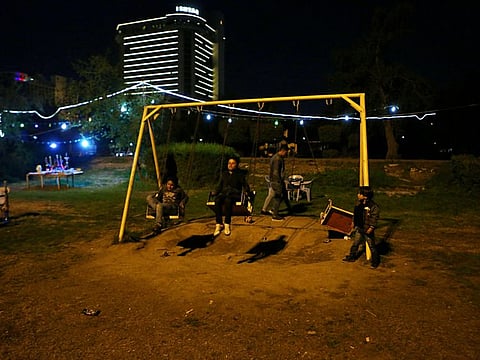For the first time in 15 years, Iraq is not at war
For Baghdad, sense of hope, respite after years-long war against Daesh

Baghdad: Baghdad’s main commercial district has seen more bombings than its residents can count.
Death visited almost daily during times of war - most horrifically, a 2015 suicide bombing that ripped through two shopping malls, killing over 300 people.
But over the past year or so, the residents of Karrada have felt more normal than they have in decades.
Streets lined with food stalls are crowded with shoppers, coffee shops and restaurants are packed until late, and the grey cement blast walls that protected against bombings are being removed.
“I used to go to school and come back home, nothing more,” said Rusul Mohsen, a 33-year-old middle school teacher, seated recently at a store front sipping coffee.
“If I went to a restaurant, I would ask to sit in a corner the farthest away from any windows, fearing a car bomb explosion might shatter the glass.”
Moment of respite
For the first time in 15 years there is no major war or insurgency in Iraq, and the defeat of Daesh in late 2017 after a ruinous four-year war has given the population a moment of respite.
Despite the enormous challenges ahead, there is a guarded sense of hope across the capital.
Car bomb explosions that became the norm after the US-led invasion in 2003, making the Iraqi capital’s name synonymous with war, have ceased - at least for now.
Thousands of concrete barriers that snaked through the city as protection from suicide car bombers have been towed away in trucks, easing traffic.
Army spokesman Brig. Gen. Yahya Rasool said thousands of barriers have been towed away to a plot of land on the outskirts of the city, saying they may be used in the future around Baghdad to protect against infiltration.
Parts of Green Zone reopened to public
Parts of the heavily fortified Green Zone on the west bank of the Tigris River have reopened to the public, including public access to the landmark “Victory Arch” - a 40-meter (131-feet) tall arch of two swords held by bronze casts of former dictator Saddam Hussain’s hands to commemorate the Iran-Iraq war.
The US established the Green Zone in 2003 to secure its embassy and Iraqi government institutions.
But the zone became a symbol of the country’s inequality, fueling the perception among Iraqis that their government is out of touch.
On the other side of the river, Baghdad’s famous Rasheed Street, the capital’s oldest street and cultural center known for its crumbling, old Iraqi houses, has also reopened for cars and pedestrians after a 15-year closure due to security risks.
A new Central Bank headquarters, a towering waterfront building on the banks of the Tigris designed by the late Iraq-born architect Zaha Hadid, is currently under construction, expected to be completed next year.
“Baghdad feels better than it has since 2003,” remarked a veteran Western diplomat in Baghdad.
In Karrada, the Hadi Center where a 2015 suicide bombing trapped people in a burning inferno for hours, killing around 300 people, is full of shoppers and youngsters fill the food court. The adjacent Laith Center had to be razed and rebuilt from scratch. It’s now almost completed.
Assem Gharib, owner of a pastries and ice cream shop, said for years he used to pay someone to supervise the street outside his shop and keep cars from parking in front.
“I used to be frightened whenever a car approached, imagining it to be a suicide bomber or a car bomb. Now it’s the opposite, we are happy when a car parks in front of the shop,” he said.


